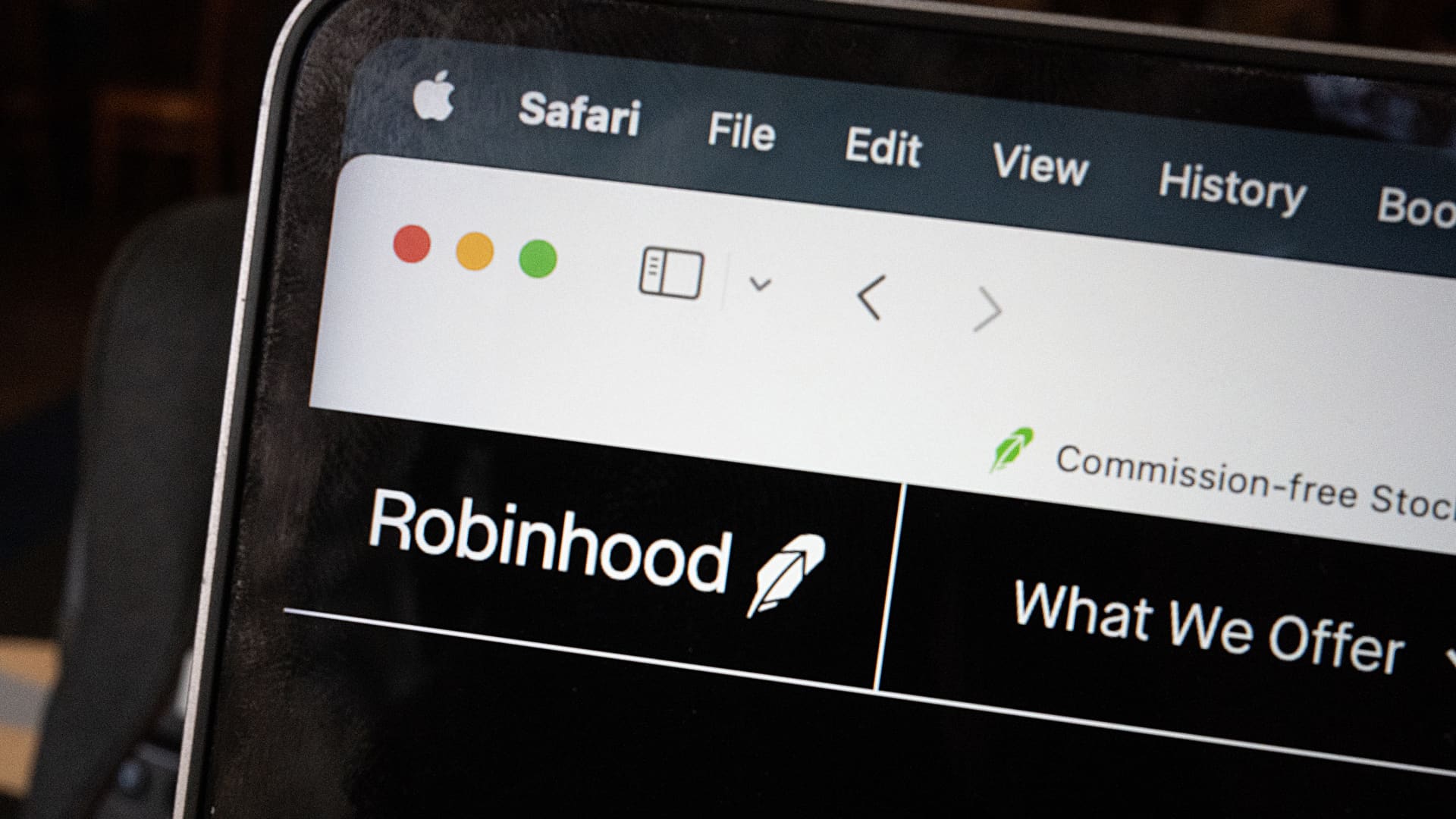In this photo illustration, the Robinhood Markets Inc. website is shown on a computer on June 06, 2024 in Chicago, Illinois.
Scott Olson | Getty Images
Online brokerage platform Robinhood on Wednesday launched a share lending program in the U.K. that would allow consumers there to earn passive income on stocks they own, in the company’s latest bid to grow market share abroad.
The stock trading app, which launched in the U.K. last November after two previous attempts to enter the market, said that its new feature would enable retail investors in the U.K. to lend out any stocks they own outright in their portfolio to interested borrowers.
You can think of stock lending like “renting” out your stocks for extra cash. It’s when you allow another party — typically a financial institution — to temporarily borrow stocks that you already own. In return, you get paid a monthly fee.
Institutions typically borrow stocks for trading activities, like settlements, short selling and hedging risks. The lender still retains ownership over their shares and can sell them anytime they want. And, when they do sell, they still realize any gains or losses on the stock.
In Robinhood’s case, shares lent out via the app are treated as collateral, with Robinhood receiving interest from borrowers and paying it out monthly to lenders. Customers can also earn cash owed on company dividend payments — typically from the person borrowing the stock, rather than the company issuing a dividend.
Customers are able to sell lent stock at any time and withdraw proceeds from sales once the trades settle, Robinhood said. It is not guaranteed stocks lent out via its lending program will always be matched to an individual borrower, however.
“Stock Lending is another innovative way for our customers in the UK to put their investments to work and earn passive income,” Jordan Sinclair, president of Robinhood U.K., said in a statement Wednesday.
“We’re excited to continue to give retail customers greater access to the financial system, with the product now available in our intuitive mobile app.”
Niche product
Share lending isn’t unheard of in the U.K. — but it is rare.
Several firms offer securities lending programs, including BlackRock, Interactive Brokers, Trading 212, and Freetrade, which debuted its stock lending program just last week.
Most companies that offer such programs in the U.K. pass on 50% of the interest to clients. That is higher than the 15% Robinhood is offering to lenders on its platform.
Share lending is risky — not least due to the prospect that a borrower may end up defaulting on their obligation and be unable to return the value of the share to the lender.
But Robinhood says on its lander page for stock lending that it aims to hold cash “equal to a minimum of 100% of the value of your loaned stocks at a third-party bank,” meaning that customers should be covered if either Robinhood or the institution borrowing the shares suddenly couldn’t return them.
Robinhood keeps cash collateral in a trust account with Wilmington Trust, National Association, through JP Morgan Chase & Co acting as custodian, a spokesperson for the firm told CNBC.
Simon Taylor, head of strategy at fintech firm Sardine.ai, said that the risk to users of Robinhood’s share lending program will be “quite low” given the U.S. firm is behind the risk management and selecting which individuals and institutions get to borrow customer shares.
“I doubt the consumer understands the product but then they don’t have to,” Taylor told CNBC via email.
“It’s a case of, push this button to also make an additional 5% from the stock that was sitting there anyway. Feels like a no brainer.”
“It’s also the kind of thing that’s common in big finance but just not available to the mainstream,” he added.
The new product offering might be a test for Robinhood when it comes to gauging how open local regulators are to accepting new product innovations.
Financial regulators in the U.K. are strict when it comes to investment products, requiring firms to provide ample information to clients to ensure they’re properly informed about the risk attached to the products they’re buying and trading activities they’re practicing.
Under Britain’s Financial Conduct Authority’s consumer duty rules, firms must be open and honest, avoid causing foreseeable harm, and support investors’ ability to pursue their financial goals, according to guidance published on the FCA website in July last year.
Still, the move is also a chance for Robinhood to try to build out its presence in the U.K. market, which —apart from a select number of European Union countries — is its only major international market outside of the U.S.
It comes as domestic U.K. trading firms have faced difficulties over the years. Hargreaves Lansdown, for example, last month agreed a £5.4 billion ($7.1 billion) acquisition by a group of investors including CVC Group.
The company has been battling issues including regulatory changes, new entrants into the market, including Revolut, and the expectation of falling interest rates.
Unlike Robinhood, which doesn’t charge commission fees, Hargreaves Lansdown charges a variety of different fees for consumers buying and selling shares on its platform.

 Blog Post1 week ago
Blog Post1 week ago
 Economics1 week ago
Economics1 week ago
 Finance1 week ago
Finance1 week ago
 Personal Finance1 week ago
Personal Finance1 week ago
 Accounting1 week ago
Accounting1 week ago
 Economics1 week ago
Economics1 week ago
 Personal Finance6 days ago
Personal Finance6 days ago
 Personal Finance1 week ago
Personal Finance1 week ago










